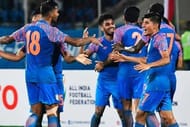On a sizzling Saturday afternoon at the Royal Western India Turf Club in Mumbai, a group of curious young girls avidly watched on as Klaus Augenthaler shared various nuances of the beautiful game. The 1990 FIFA World Cup winner had come down to the financial capital of the country to attend an event organised by Hafele, in partnership with Bayern Munich and the Bundesliga.
Consequently, the legend imparted an enormous amount of knowledge as those in attendance gaped in awe at the former footballer’s charm and exemplary understanding of the sport.
Klaus started off with a masterclass wherein he guided the budding youngsters on various technical aspects, namely dribbling, heading and passing. Thereafter, he took part in a small-sided game with the German enlightening the girls on how to use the aforementioned skills within an encounter.
Moments after the match ended, the former Bayern Munich star was keen to answer numerous questions, ranging from his playing career, the evolution of defenders, the German national side, the upward trajectory of Indian football and of course, Bayern Munich.
In an exclusive chat with Sportskeeda, he elaborated on how the manager’s role has become tougher, with the increased coverage of the game nowadays, meaning that even the cream of the crop isn’t spared from constant scrutiny.
Furthermore, he talked about his experiences as a manager across the globe, where he garnered a lot of insights towards football and in general, life. When quizzed about the personality trait he believed to be the most paramount for a manager, he replied,
“A manager must be honest with whatever he is doing, whether it be with himself or while interacting with his team. Being a manager is extremely difficult and there might be situations where you might have to leave the club. But, the important thing is to stay honest to yourself and go along doing what you feel is correct.”
On similar lines, Klaus opened up on how the Bavarians had done well in the past fifteen months and how he found the media quite unforgiving when it came to Niko Kovac. He opined,
“Last year, the start was quite tough for Niko. But, eventually, he got into his groove and led Bayern to the Bundesliga, despite trailing Borussia Dortmund by 9 points at one point. Additionally, he capped the season off by winning the DFB-Pokal Cup. Thus, I find it surprising that he draws as much criticism as he does.”

He also talked about how a manager must try to blend the players at his disposal optimally with the system he wants to deploy, thereby treading a fine line but one that is necessary to get the best out of the resources.
In continuation, he also reckoned that managers needed to keep themselves appraised of the new patterns and trends that engulf the footballing fraternity at different junctures.
Through the course of his career, Klaus had distinguished himself playing the role of the sweeper at the back. A couple of decades ago, football placed different demands on what central defenders were required to do. Yet, considering the cyclical and evolving nature of the sport, players of such ilk are expected to do just a tad more than defend nowadays.
When asked about the change in a defender’s perspective, the former defender said,
“These days, the game has changed considerably and most teams are inclined to press the ball high up the pitch. In the process, defenders need to be good with their feet to play through those pressing lines and mount attacks. Moreover, they should also be excellent in their decision making, considering they might have to launch the ball forward on occasions. Not only defenders but also goalkeepers have had to improve their skill with the ball. If you look at Manuel Neuer, he could play as a defender in the second division and that is just because of how good he is as a footballer.”
To conclude an illuminating conversation, Klaus quipped that he was immensely impressed by the giant strides made by Indian football, in light of the growing popularity of the Indian Super League. In addition, he chatted about the countless elements that help a nation become a footballing force. On the topic, he remarked,
“The way India has progressed in the past few years has been superb and the improvement at the grass-root level has been quite essential. There is a bit of genetics involved, for example, some nations might have athletes with slightly quicker reactive muscles and it might be helpful. But, in the end, it is the training and the work put in behind the scenes that actually helps a country catapult itself as a footballing entity.”
He added, “To give an example, each year teams from China play the FC Bayern Youth Cup but they always struggled to compete with the other sides. However, this year they came 3rd and to many, it was a surprise. But to me, it wasn’t as astonishing considering the talent we had seen and the way we had trained the youngsters when we were in China.”

Thus, Klaus had highlighted that India just needed to be a bit patient with their footballing sojourn, considering the Blue Tigers had already scaled many a steep peak.
More importantly, though, he put to bed a rather unfounded notion that Indians are not just cut out for football, biologically or culturally. In the process, he hinted that those facets are just a tiny piece in a larger jigsaw, wherein the infrastructure, the methods of training and the system of bringing players through, should be accorded much greater significance.
Additionally, he suggested that India, as a footballing nation, needs some time to traverse paths that would eventually lead the country to where it wants to be.
After all, the potential delirium at the end would taste much sweeter if one has waited for it long enough, wouldn’t it?
